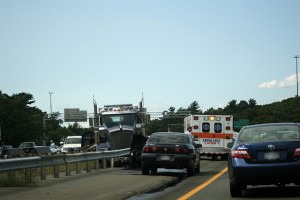 The scene of even a minor car accident can become quite chaotic with the adrenaline rush, police presence and the nature of injuries suffered by those involved. It can suddenly become very difficult to focus with so many unfamiliar things happening all around.
The scene of even a minor car accident can become quite chaotic with the adrenaline rush, police presence and the nature of injuries suffered by those involved. It can suddenly become very difficult to focus with so many unfamiliar things happening all around.
Since most people are rarely involved in a traffic accident of any sort, it’s easy to overlook the steps that can make coping with the aftermath of a collision easier and more efficient. By keeping a few tips in mind, any motorist can get over a car accident with a minimum complications.
Check for Injuries
After an accident, it’s important to assess any injuries that may have been sustained. This makes for a more efficient call to the police or 911 (if serious) that provides a clearer description of the event and allows the caller to request appropriate medical assistance.
Call the Police
In all but the most inconsequential of fender benders, it makes sense to get the police involved.
- They will write a report of the incident which may be helpful later on when filing insurance claims or in the case of a dispute between the involved parties.
- Police also have the necessary equipment and manpower to secure the scene, making it possible for traffic to keep moving safely.
Get to a Safer Place
Too often, accidents happen in areas with heavy traffic and little protection for pedestrians or people outside their cars.
- Keeping basic safety steps in mind, like looking both ways before crossing the street, is an excellent way to make certain that one accident does not cause another.
- If at all possible, it’s suggested that motorists involved in an accident move to a safer place, like a sidewalk, to await help.
Don’t Admit Guilt or Accuse Others
Emotions run high after an accident, but it’s not the appropriate time for apologies or recriminations.
- Strive to say as little as possible regarding the scene of accident to the other involved parties.
- It’s impossible to tell how statements that are made at the scene of an accident may be construed later in the context of an insurance claim or a legal proceeding.
Some people show exemplary presence of mind and use discretion and keep communication to a bare minimum.
Share Information
Some communication with the other involved parties is absolutely essential. However, it’s easy to forget just what needs to be shared/ noted that can be referenced later by the insurance companies.
On the back of most proof of insurance cards, motorists will find a list of items of information that are useful in the event of an accident. It’s easiest to follow this list, especially when adrenaline is flowing. Generally, the information exchanged includes:
- The names, phone numbers and addresses of involved drivers
- Driver’s license numbers
- Insurance information including insurance company and policy number
- Vehicle information including make, model and year
- License plate number
It makes absolute sense to write everything down, since its difficult to remember all important details amid the chaos of an accident scene.
Record Details
Even a few hours after the event, it can be challenging to recall details. After exchanging information with other drivers,
- One simple way to take everything on record is by clicking photos of the vehicles at the scene.
- It might even be a good idea to write down minutes of the events, as this can be useful when dealing with the insurance company.
Contact the Insurance Company
Once the scene is cleared and the drivers are free to go, it’s time to call the insurance company. Reporting the accident sooner rather than later usually makes the claims process go a bit quicker.
An automobile accident can be a difficult event. However, remembering the steps to take immediately after a crash is an excellent method for sorting out chaotic circumstances with relative ease.
[Image:http://www.flickr.com/photos/ms-ito/1405565784/]
Scott Desind
Latest posts by Scott Desind (see all)
- How to Request the County Seat and Fight Your California Traffic Ticket - May 21, 2023
- Don’t Even Touch That Cell Phone - July 13, 2022
- Innocent Until Proven Guilty - March 2, 2020

